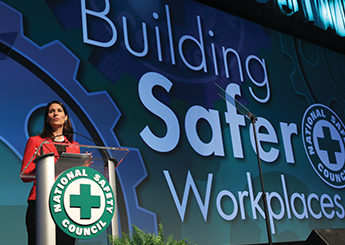Highlights: 2015 NSC Congress & Expo

Executive Forum: Failure as success, video games among safety innovations

Video games and the idea of embracing failure are just some of the innovations that can help lead to safer workplaces, speakers said during the Executive Forum at the NSC Congress & Expo. The forum was presented by the Campbell Institute, which promotes environmental, health and safety excellence.
“Our challenge from an innovative standpoint is that we define safety incorrectly,” said Todd Conklin, human and organizational performance expert and advisor for Los Alamos National Labs. “What we do is measure safety success by counting the number of people we hurt. That’s stupid.”
Instead of reacting to incidents and injuries, Conklin recommends responding to contexts. Systems should be created in which employers know failure will occur, and then make that failure as safe as possible, he said.
Aaron Walsh suggested that allowing employees to repeatedly experience failure could help with safety training. Walsh, the director of the Immersive Education Initiative, expounded on the merits of virtual reality to better engage workers. Popular video games such as Skyrim and Mirror’s Edge place people in situations in which they must perform certain tasks that resemble lockout/tagout or working from height – gamers must succeed or face dire consequences.
These games and other similar training simulations fully immerse users in an environment. And unlike real life, people using virtual reality training have the opportunity to safely visit the experience again and again to learn.
Sam Smolik, senior vice president for LyondellBasell’s manufacturing and refining operations in the Americas, brought things home by encouraging the setting of a positive culture – one in which employees will want to do things properly all the time. “It’s not about the numbers,” Smolik said. “It’s about people.”
Executive Edge workshops share strategies for engagement and off-the-job safety
Safety professionals who want to make a difference have to look beyond a worksite’s doors and learn how to engage with employees in an increasingly global world.
Two Executive Edge workshops also were presented by the Campbell Institute. The hands-on workshops featured EHS leaders from world-class organizations sharing best practices on both off-the-job safety and employee engagement.During the first workshop, “Living Safely – Comprehensive EHS Strategies On- and Off-the-Job,” experts provided creative solutions to protect both employees and communities at work and at home.
During the second workshop, experts presented “Making Engagement Work – Strategies & Solutions in a Complex World,” which taught attendees how to better engage leaders, employees, contractors and communities in a world with organizations becoming more global and supply chains becoming more complex.
Campbell Institute names award recipient, welcomes new members
Honeywell Aerospace is the recipient of the 2015 Robert W. Campbell Award, presented annually to an organization that showcases excellence in EHS management.
“While Honeywell Aerospace is known for manufacturing world-class products to keep all of us safer in flight, today they are receiving the Campbell Award because they are best-in-class at keeping their workforce safe,” Deborah A.P. Hersman, president and CEO of the National Safety Council, said in a press release. “Honeywell Aerospace is far along on its Journey to Safety Excellence, yet it still strives to do better – the hallmark of a world-class organization.”
The Campbell Institute also welcomed six new member organizations: AECOM, The Boeing Company, BROWZ, Burlington Northern Santa Fe Railway, Norfolk Southern, and Mosaic.
Post a comment to this article
Safety+Health welcomes comments that promote respectful dialogue. Please stay on topic. Comments that contain personal attacks, profanity or abusive language – or those aggressively promoting products or services – will be removed. We reserve the right to determine which comments violate our comment policy. (Anonymous comments are welcome; merely skip the “name” field in the comment box. An email address is required but will not be included with your comment.)

